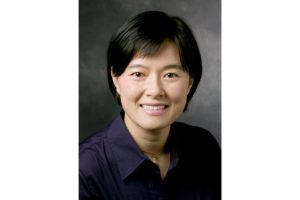
Bianxiao Cui of Stanford University will visit Maryland Hall 110 for her talk, “Curvature-Induced Cell Adhesion and Drug Discovery,” at 3pm on Wednesday, March 26th.
Abstract: Curvature-Induced Cell Adhesion and Drug Discovery
The extracellular matrix (ECM) is primarily composed of fibrous proteins such as collagen, elastin, and fibronectin, which form a supportive fiber meshwork. When cells are in contact with ECM fibers, their cylindrical geometry can induce membrane wrapping and the formation of local curvatures. We found that these membrane curvatures promote the formation of a new type of integrin-mediated cell adhesions – curved adhesions. Curved adhesions are molecularly distinct from focal adhesions and are prevalent in soft fiber matrices in 3D. The balance of focal adhesions and curved adhesions are dependent on the stiffness and the topography of ECM. The findings illustrate the molecular basis for mechanotransduction in different extracellular environments. They also open up new frontiers for drug discovery.
Bio: Bianxiao Cui
Bianxiao Cui is the Job and Gertrude Professor of Chemistry and a fellow of the Wu Tsai Stanford Neuroscience Institute at Stanford University. She holds a Ph.D. degree in Chemistry from the University of Chicago and a BS degree from University of Science and Technology of China. Her main area of interest is to understand how cells and tissues interact with nanoscale topographic features of material surfaces. She develops optical and electrode-based tools to study electrophysiology and signal transduction in neurons. She also studies membrane curvature and curvature-induced intracellular signaling. Her awards and distinctions include Ono Pharma Breakthrough Science Initiative award, Barany Award from Biophysical Society, NIH New Innovator Award, NSF CAREER award, NSF Inspire award, Packard Fellowships in Science and Engineering, Hellman Scholar, Searle Scholar Award and Dreyfus New Faculty award.